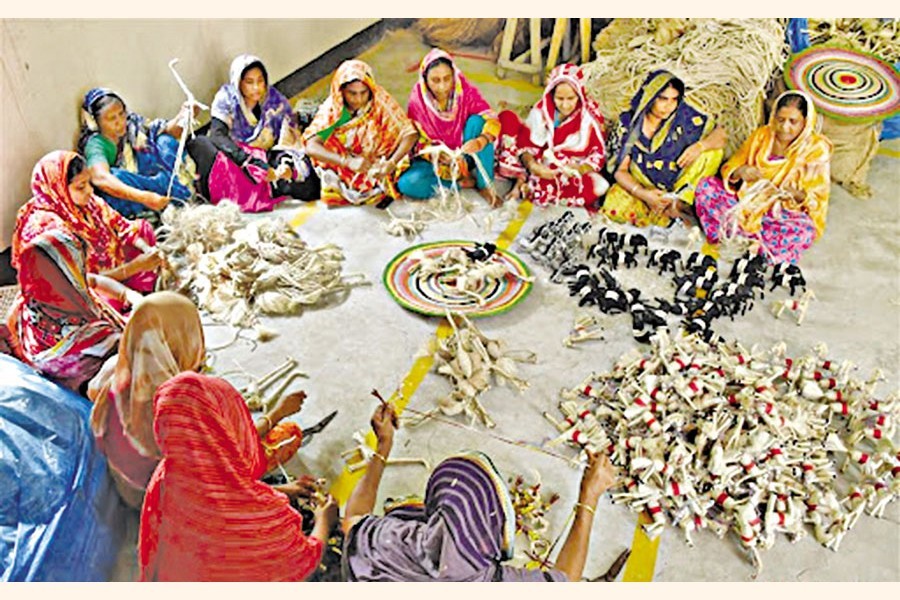Lack of docs, database make difficult for woman entrepreneurs to access finance

Published :
Updated :

Women-led enterprises in the country have long been facing difficulty in accessing finance of formal channels -- mainly for lack of information, improper documentation, complexity in availing trade licence, and absence of a comprehensive database.
Besides, financial institutions are also reluctant to provide loans to women entrepreneurs under the stimulus packages, announced by the government for pandemic recovery, because of lower profitability at higher risks, speakers said at a programme on Sunday.
They opined that evidence-based field researches, carried out in the country during the pandemic, were also neglected in the policymaking process, which made a low impact on pandemic recovery.
The observations came at a policy dialogue titled "COVID-induced Stimulus Packages for SMEs and Women-led Enterprises: Exploring Research-Policy Inter-linkages".
The event was organised by the Centre for Policy Dialogue (CPD) in partnership with the Asia Foundation - under the Women's Economic Empowerment through Strengthening Market Systems (WEESMS) programme, funded by the Embassy of Sweden.
Minister for Local Government, Rural Development and Cooperatives Md Tajul Islam addressed the event as the chief guest.
Member of Standing Committee on Ministry of Foreign Affairs Kazi Nabil Ahmed spoke as the special guest. Swedish Ambassador Alexandra BergVon Linde, and BRAC Chairperson Dr Hossain Zillur Rahman spoke as the guests of honour.
Moderated by CPD Executive Director Dr Fahmida Khatun, other discussants of the event included - SME Foundation General Manager Farzana Khan, e-Commerce Association of Bangladesh (e-CAB) Joint Secretary Nasima Akter Nisha, Dhaka University professors Dr M Abu Eusuf and Dr Sayema H Bidisha, and Bangladesh Bank (BB) Deputy General Manager Liza Fahmida.
Asia Foundation Country Representative Kazi Faisal Bin Seraj and iDE Bangladesh Associate Director (Programmes) Saroja Thapa also spoke on the occasion.
CPD Research Director Dr Khondaker Golam Moazzem made the keynote presentation.
In the presentation, he said around 74 per cent of the Tk 200-billion stimulus package for the SME sector are disbursed so far, of which only 5.59 per cent of the recipients are women.
Referring to the existing hardship in accessing loans for women, he noted that many women entrepreneurs do not even know how to apply or where to go for availing of loans from the stimulus package.
At the same time, banks are also somewhat unwilling to provide loans under the package for SMEs, especially to women-led small businesses, against the backdrop of not having proper documents and guarantors.
During the pandemic, a total of 52 studies were identified, which were related to the COVID-19 pandemic along with its association with SMEs and women entrepreneur-related concerns.
Due to absence of a comprehensive database on SMEs and women entrepreneurs, it has been very difficult for the authorities concerned to identify eligible beneficiaries for the stimulus package, Dr Moazzem opined.
Besides, loan concentration among women entrepreneurs was mostly in urban areas, which created an urban-rural division in getting supports for pandemic recovery, he added.
The minister, in his speech, said due to different policy interventions, the country's per capita income grew rapidly in the last decade and even during the pandemic.
The government took timely strategies, like offering the Tk 1.29-trillion stimulus packages, from the beginning of the pandemic, which saved the country in many ways from the adverse effect of the global economic crunch.
Addressing the issues related to alleged irregularities in disbursement of stimulus funds, he said, "In our society, there is lack of good governance, lawlessness and corruption. Despite those constraints we will continue to progress, and one day we may overcome those anomalies."
Appreciating the research by the CPD, he hoped that its findings would be reflected in the policymaking process in near future.
Regarding difficulty for women entrepreneurs in getting trade licences, he added, "There are some problems at the policy level, and we are trying to address the issue. But without automation, it will not be possible to resolve the problems soon."
Dr Fahmida Khatun said if loans are distributed through micro-finance institutions (MFIs), it would be easy for SMEs and women entrepreneurs to avail funds, as commercial banks have different policy constraints.
At the same time, if the policymakers take into account the evidence-based research and rigorous analysis of different organisations, policymaking would be a bit more easy and impactful.
Contradicting the CPD executive director, Professor Yusuf said as loans are disbursed through banks, beneficiaries can take those at 4.0 per cent interest rates. But in the case of the MFIs, the loan interest rates may go up to 9.0-12 per cent.
Unless the government subsidises more, the rates offered by the MFIs would not attract small businesses to take loans, he mentioned.
Dr Bidisha said even before the pandemic there were many constraints for women to get loans from formal channels, which were intensified further during the pandemic.
She identified access to finance, lack of information, lack of product marketability, and poor supply chain as the biggest concerns for women entrepreneurs.
Besides, lack of proper monitoring and evaluation of the stimulus programmes also added to the complexities for women-led businesses, she concluded.
ahb_mcj2009@yahoo.com


 For all latest news, follow The Financial Express Google News channel.
For all latest news, follow The Financial Express Google News channel.